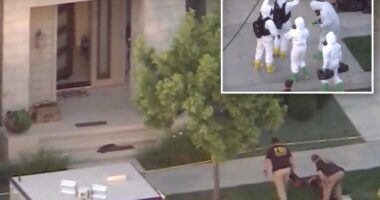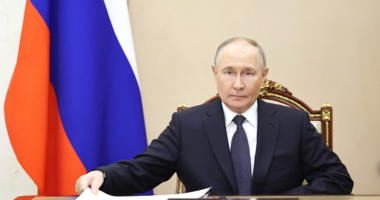Share this @internewscast.com

By MELANIE LIDMAN and JULIA FRANKEL, Associated Press
JERUSALEM (AP) — Just days ago, Maj. Gen. Yifat Tomer-Yerushalmi held the prestigious position of top legal authority in the Israeli military. Now she finds herself embroiled in a national scandal, following a dramatic series of events that began with her sudden resignation, a mysterious disappearance, and a tense search effort that culminated with her discovery on a Tel Aviv beach.
This real-life drama unfolded after Tomer-Yerushalmi confessed to authorizing the release of a surveillance video at the heart of a contentious investigation into accusations of serious misconduct against a Palestinian detainee at a notorious Israeli military facility.
The footage captures a portion of an incident where Israeli soldiers are accused of sexually assaulting the detainee, thrusting the issue into the public eye.
By leaking the video last year, Tomer-Yerushalmi intended to highlight the gravity of the case her office was handling. However, the move backfired, sparking intense criticism from Israel’s hard-right political figures. Despite her resignation under mounting pressure, personal attacks against her continued unabated.
Tomer-Yerushalmi left behind a puzzling note for her family and abandoned her vehicle near a beach, raising alarms about her well-being and prompting a widespread search that even employed military drones in the effort to locate her.
She left a cryptic note for her family and abandoned her car near a beach. That led to fears she may have taken her own life and prompted an intensive search that included the use of military drones.
She was found alive at the beach Sunday night, at which point more vitriol against her was unleashed.
“We can resume the lynch,” right-wing TV personality Yinon Magal, an ally of Prime Minister Benjamin Netanyahu, posted on X with a winking-face emoji.
After it was revealed that one of Tomer-Yerushalmi’s phones had disappeared, right-wing politicians and commentators began to accuse her of staging a suicide attempt as a way to destroy potential evidence.
The extraordinary episode shows two years of devastating war have done little to heal a country that was deeply divided even before Hamas’ Oct. 7, 2023, attack. It also makes Tomer-Yerushalmi the latest in a long line of top security officials who have either left office or been forced out, most of them to be replaced by people considered loyal to Netanyahu and his hardline government.
Anger over leak distracts from severe abuse at heart of case
At a court hearing Monday, the judge said Tomer-Yerushalmi’s detention would be extended until Wednesday on suspicion of committing fraud, breach of trust and obstruction of justice. While the investigation into her actions continues, she is being held at a women’s prison in central Israel.
Israeli media reported that former chief military prosecutor Col. Matan Solomesh was also arrested in connection with the leak investigation. The prime minister’s office has refused to comment on Solomesh’s arrest.
The fury over the leaked video reveals the depth of polarization in Israel — and at least for the moment, keeps the media and the public focused on the leak and not the allegations of abuse.
The assault occurred on July 5, 2024, at the Sde Teiman military prison, according to the indictment against the accused soldiers. The AP has investigated allegations of inhumane treatment and abuse at Sde Teiman that predate those in the surveillance video.
That video, which has been aired by Israeli news, shows soldiers taking a detainee into an area they cordoned off with shields in an apparent attempt to hide their actions. The indictment said the soldiers assaulted the Palestinian prisoner and sodomized him with a knife, causing multiple injuries.
A medical staffer familiar with the case who spoke on condition of anonymity out of fear for his safety said the detainee arrived at a civilian hospital in life-threatening condition with blunt trauma to the abdomen and the chest and fractured ribs.
He said the detainee underwent surgery for a perforated rectum and was released back to Sde Teiman days later. The staffer said it was the most extreme abuse case he was familiar with from Sde Teiman.
When military police came to Sde Teiman in July to detain the soldiers suspected of abuse, they scuffled with protesters opposed to the arrests. Later, hundreds of violent protesters broke into the detention center.
In her resignation letter, Tomer-Yerushalmi wrote that she had exposed evidence of the abuse to counter the idea that the military was unfairly targeting its own soldiers. That idea was creating a danger to the military’s law enforcement, she said, citing the break-in.
She wrote that the military had a “duty to investigate when there is reasonable suspicion of violence against a detainee.
“Unfortunately, this basic understanding — that there are actions which must never be taken even against the vilest of detainees — no longer convinces everyone,” she wrote.
The Palestinian detainee who was the subject of the alleged abuse in the video was released back to Gaza last month as part of an exchange between living hostages and Palestinian prisoners, according to documents from the military prosecutor’s office obtained by the AP.
The case is still pending before the military court.
A web of legal issues
Three separate legal issues must be sorted out as part of Israel’s investigation into what happened at Sde Teiman, said Yohanan Plesner, the president of the Jerusalem-based think tank Israel Democracy Institute.
The first is the allegation that Israeli soldiers tortured Hamas fighters while they were in detention. The second is whether Israeli civilians, including members of parliament, tried to disrupt the investigation by breaking into the military base where the soldiers accused of the actions were being held. The third is whether the military attorney general allegedly committed a host of offenses, including fraud, to undermine the investigation into how a video purporting to show the abuse was leaked to the media.
The intense rhetoric over the past few days is reminiscent of what it was like in Israel immediately before the Oct. 7 attack that launched the war in Gaza, Plesner said. At the time, the public was deeply divided over Netanyahu’s push to overhaul the judiciary.
The concern for a few hours Sunday night about Tomer-Yerushalmi’s fate should serve as a “stop sign” to the Israeli public — and especially to commentators who derided her personally, Plesner said.
“It was very sad to see how the internal discourse can bring about such potentially tragic outcome on a personal level,” Plesner said.
It felt especially symbolic, he said, that Tomer-Yerushalmi was in court while the Israeli government held its official memorial ceremony marking the 30th anniversary of the assassination of then-Prime Minister Yitzhak Rabin.
Many regard the assassination as Israel’s lowest point in terms of divisions and incitement among the Israeli public, and worry that the dramatic events of the weekend foreshadow Israel’s return to a similar period of internal strife.
“It was very sad to see how the internal discourse can bring about such potentially tragic outcome on a personal level,” Plesner said. “There’s a way how to debate our differences in a democratic society.”

















